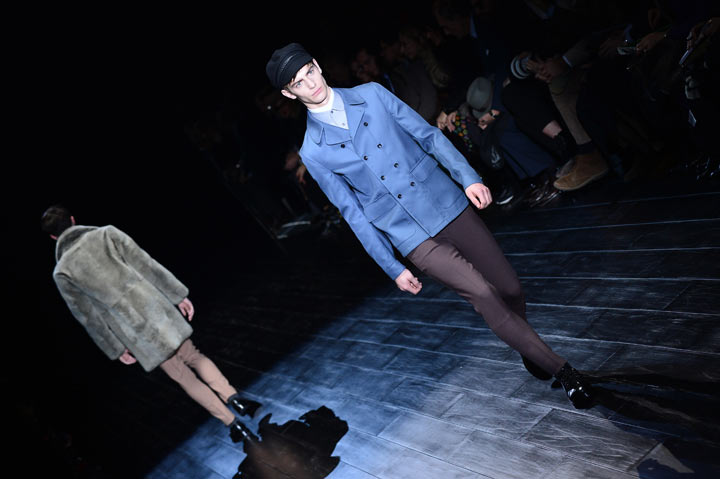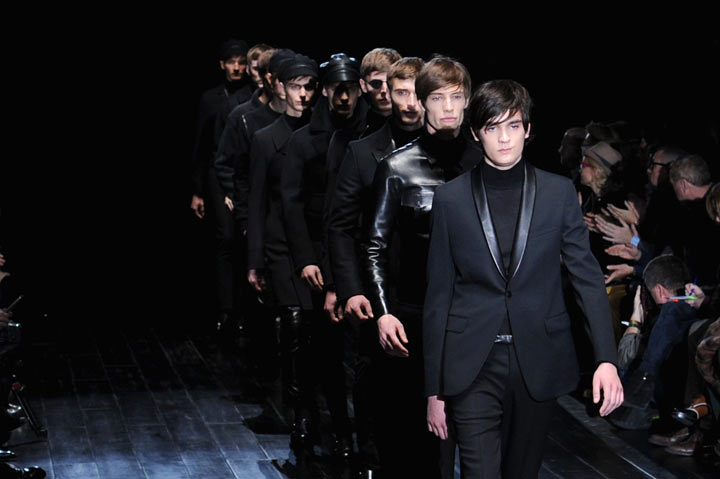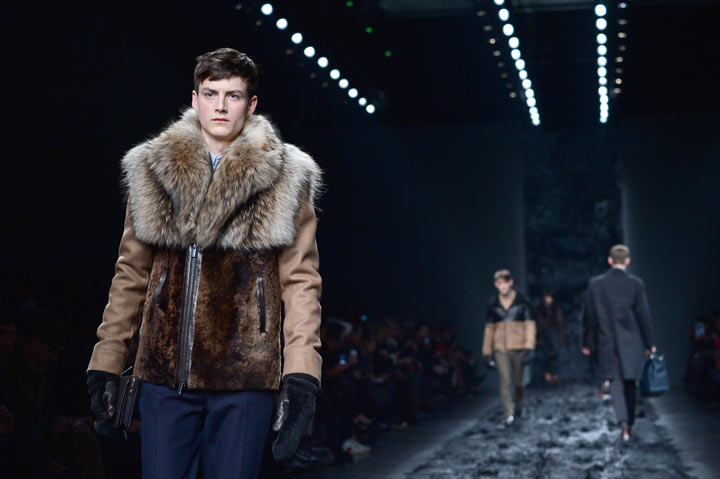MILAN, Italy – Italian fashion trumpeted its roots during the third day of Milan Fashion Week on Monday.

Milan designers emphasized what they do best, showing off tailored silhouettes, highlighting advanced textiles that elevate the looks and putting the spotlight on the artisanal work behind their exclusive wears.
Etro, the Milan-based fashion house famed for its paisley prints, went one step further, parading out the men and women who create their garments at a factory in the southern region of Apulia to the strains of local folk music.
The focus on Made in Italy provides an antidote to recent moves by foreign conglomerates to snatch up some of Italy’s prized family-run companies, many in the throes of generational change and seeking to secure their futures.
—
GUCCI
Gucci’s mod mariner cuts a boxy figure in loose-fitting short jackets and generous sweatshirts paired with slim trousers and solidly soled shoes. The peacoat that anchors the collection sports a rich, knotty texture achieved by working a traditional Tuscan fabric with neoprene.
Creative director Frida Giannini’s palate of dusty pastels creates a mood of a just-calmed storm and lends smoky contrast to the perfect black that permeates the collection.
Ready to set sail, the Gucci mariner tucks an oversized duffel or folded shopper with bamboo handles under his arm, dons his seafarer’s cap, in cloth or leather with a smart leather braid around the crown, and sets off, without squinting, into the sunrise behind his round Gucci sunglass frames.
—
FENDI
Fur and fancy were the stars of Fendi’s looks for next season.

Get breaking National news
Silvia Venturini Fendi clad the runway in swirls of sumptuous grey fur, a tell-tale sign of both the luxury and the fantasy employed in the very tactile collection. Fendi’s heritage is in fur, and Venturini Fendi knows how to treat it both with gravity it deserves while unmasking its hidden humour.
Fur panels added richness to cable-knit sweaters, while generous swaths are draped, almost like external vests or ample shawls, on overcoats. Shaggy fur covers what appears to be an adapted golf cap, complete with pom-pom.
Again, pants were slim-fitting, ending neatly at ankle-high boots or tie-ups with massive silver soles, all the better for grabbing the icy pavement.
Tufts of fur were added to the famous Peekaboo bag, enlarged for men, with the graphic suggestion of feline eyes peeking out when left agape. A bangle of fish bones hanging on the side suggest the passenger cat has just been fed.
—
EMPORIO ARMANI
Italy’s fashion titan Giorgio Armani’s Emporio Armani menswear collection for next fall and winter stood out for its use of soft fabrics so lustrous they almost seemed lit from within.
From first to last, the collection was a masterful compendium of modern good taste. Armani made his name with the artfully deconstructed men’s jacket, and the narrow silhouette at Emporio looked fresh. Slim pants ended at the ankle over chunky oxfords. Jackets were tight, with three or four buttons, and had small, high collars.
The somewhat prim vibe of the jackets was counteracted by the quiet but deep luxury of fabrics. Fur was everywhere, either peeking out of hoods in flashes, or sleekly fashioned into soft overcoats and jackets. There also were sweaters with fake fur inserts, while wool was worked to look like astrakhan.
—-
ETRO
Etro put its Made in Italy ethos in evidence by sending its tailors and seamstresses down the runway alongside models wearing their handiwork.
So a pattern-cutter named Flavio Cardilla marched down the catwalk to lively Italian folk music alongside a model wearing a closely fitted hound’s-tooth suit, one of the many artisans joining in the parade.
“This show is dedicated to our tailors,” said Kean Etro, who designs the menswear collection. “After all, we’re together day in, day out.”
The fashion house that has made paisley a way of life devised this collection out of a jangle of contrasting checks and plaids. The silhouette was slim and tight, layered with waistcoats and topped with a wildly printed paisley wool scarf for a look that is pure 21st-century dandy. Briefcases and suitcases in matching patterns completed the look.
—-
ANTONIO MARRAS
Antonio Marras drew from Italy’s expertise in textiles and tailoring, and his own roots as the son of a fabric merchant growing up in provincial Sardinia for his latest collection.
It featured tailored looks for the office, like a patch-pocket blazer done in a deep blue and grey plaid. The menswear story for next winter seems to be about a skinny silhouette with pants skimming the ankles.
Marras used plenty of interesting fabrics, including felted gabardine, polka dot corduroy, and jacquard jerseys usually reserved for neckties.
In homage to Italy’s sartorial tradition, Marras set the stage with rows of tailors hunched over their sewing machines, from young boys to old men.
“It’s a concert to the sound of the sewing machine,” he said. “My father had a fabric shop.”









Comments